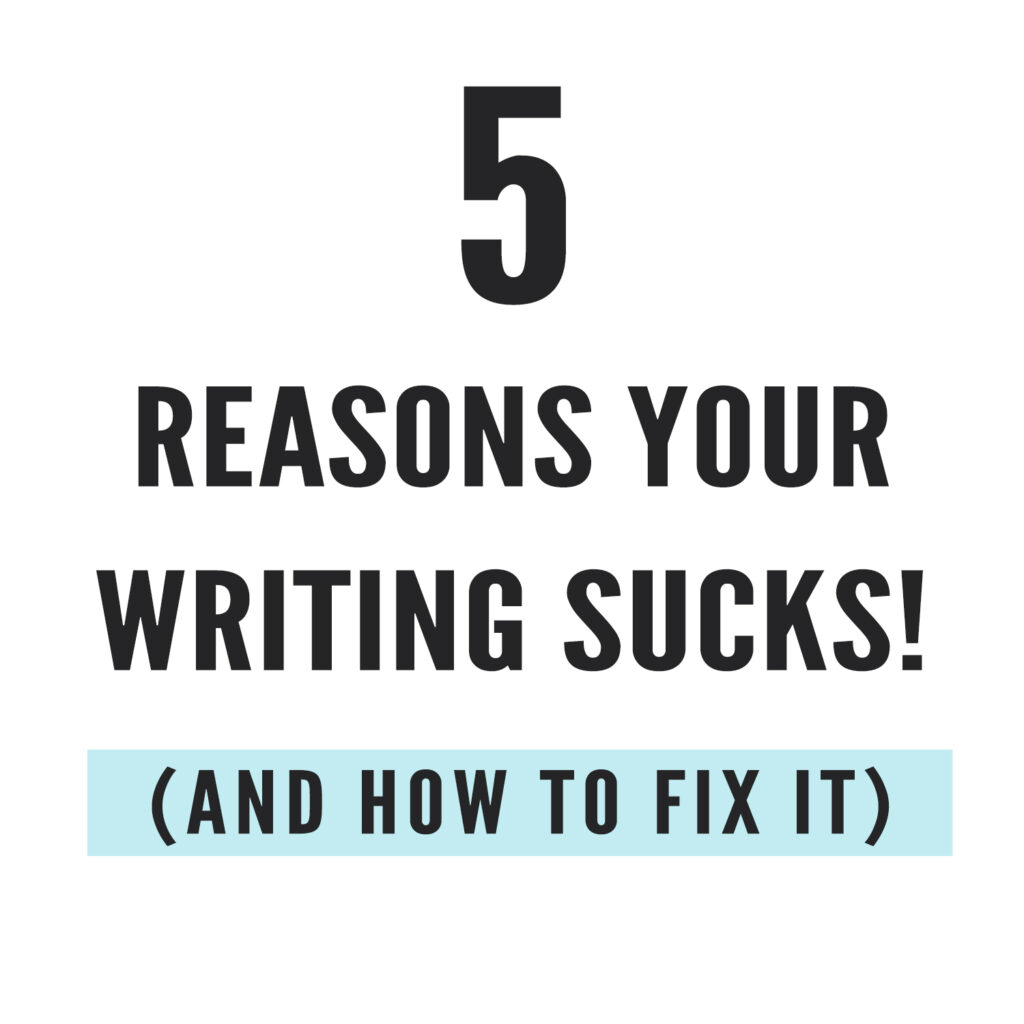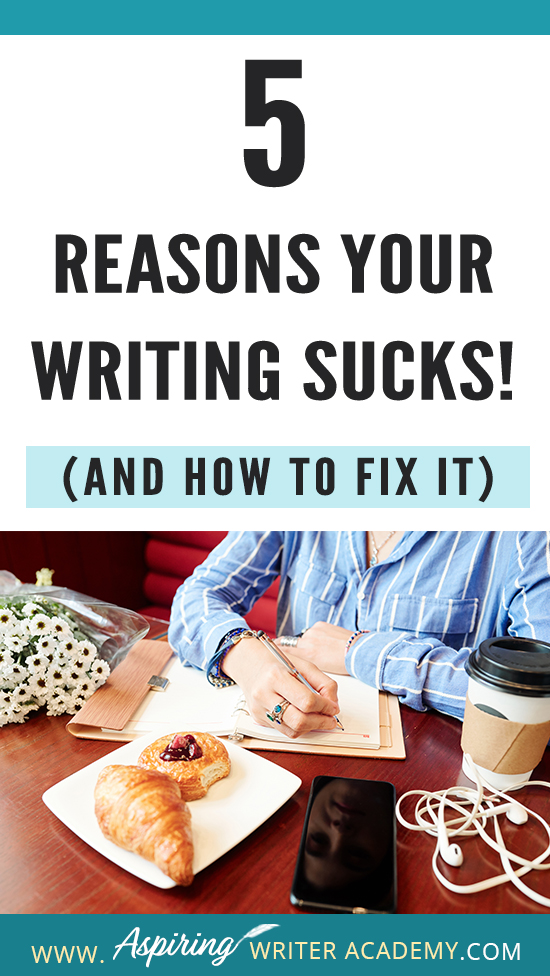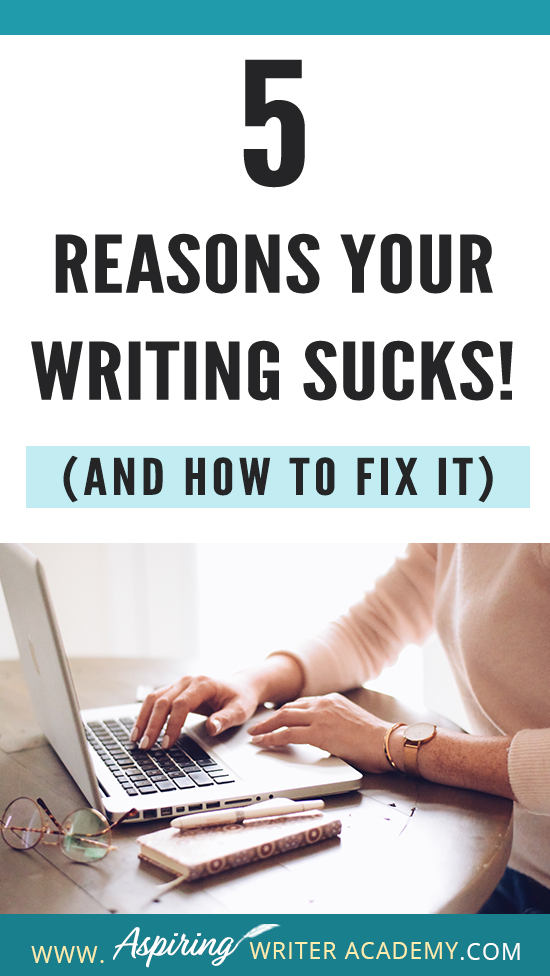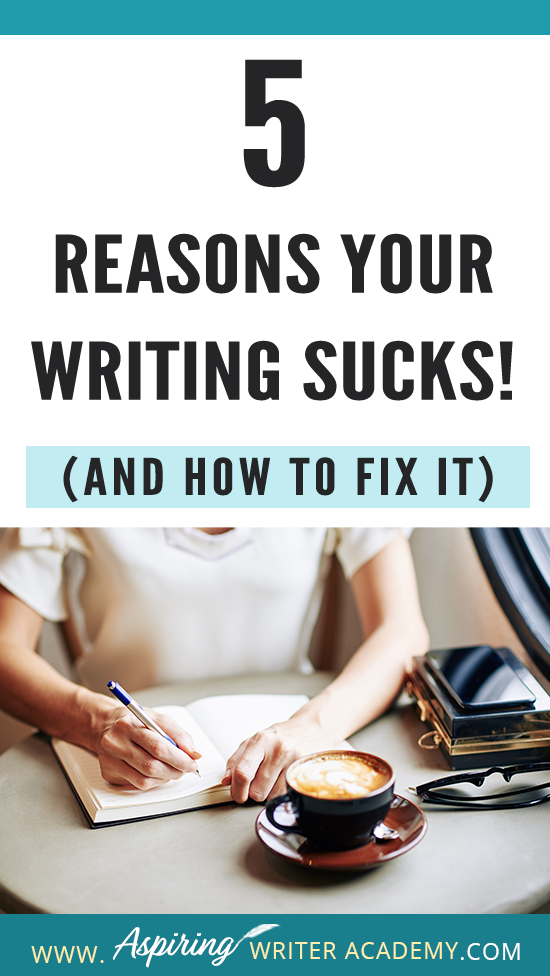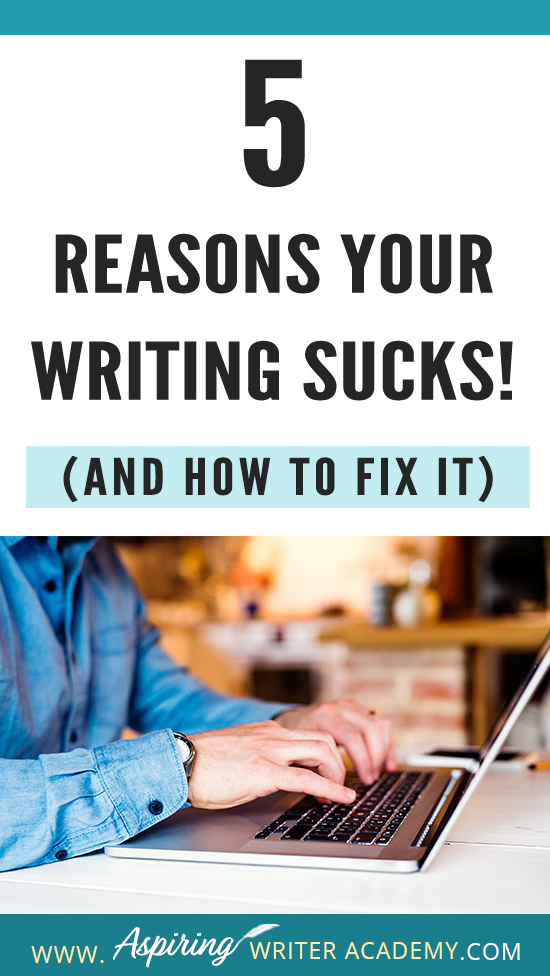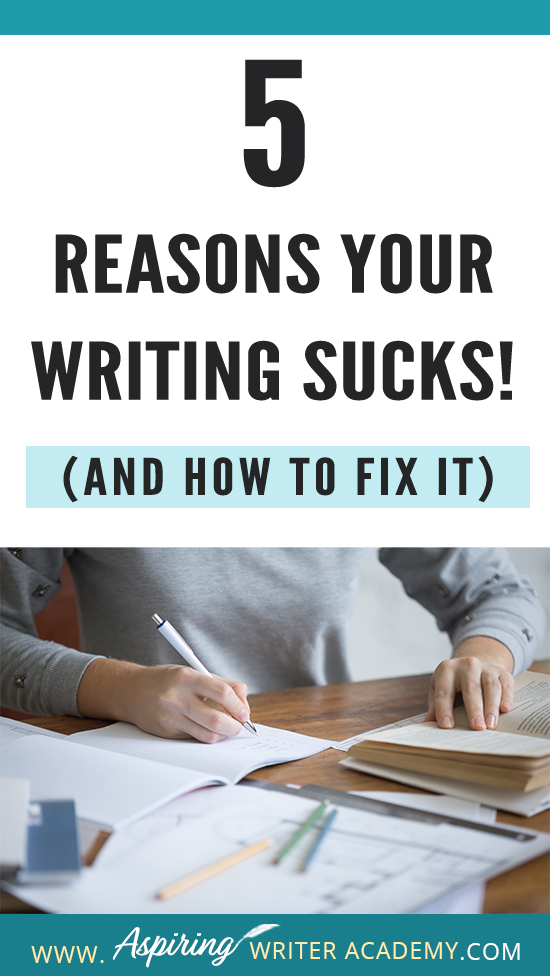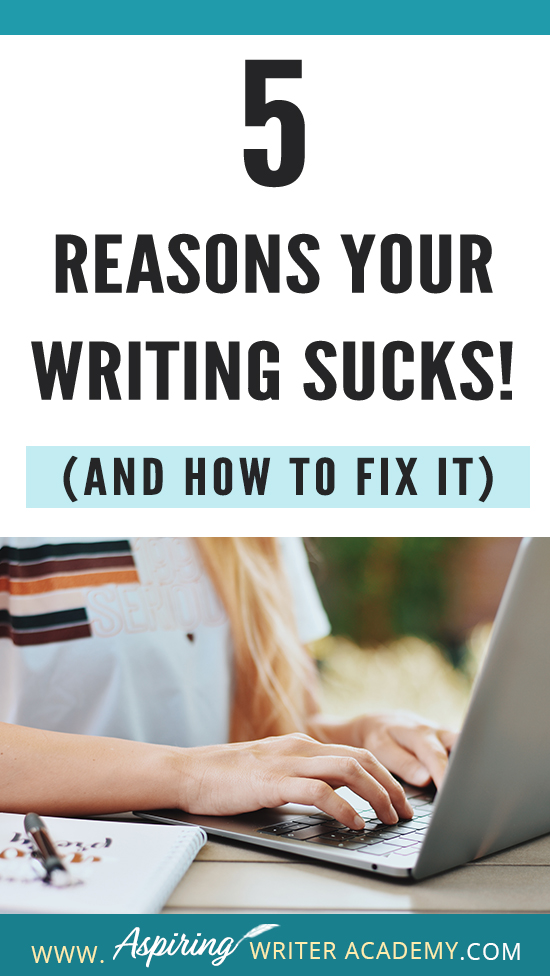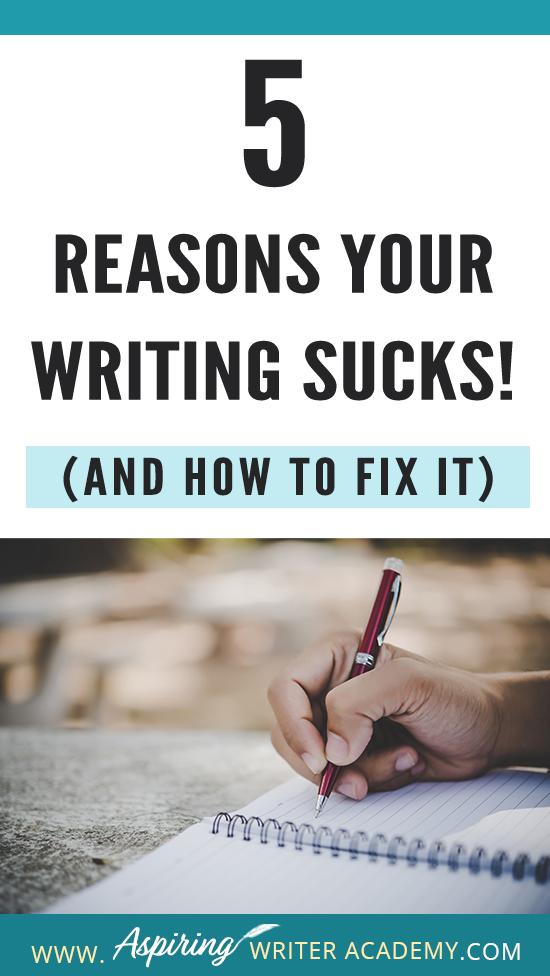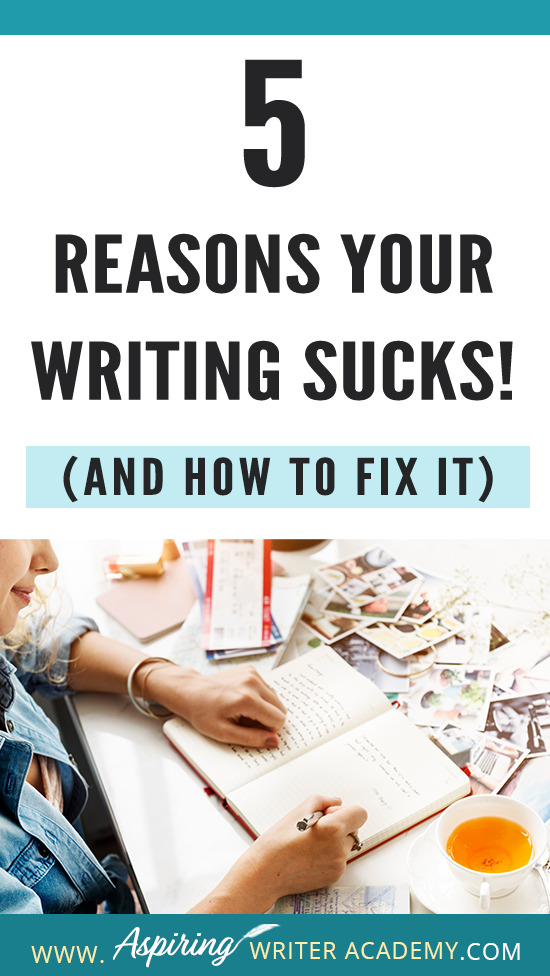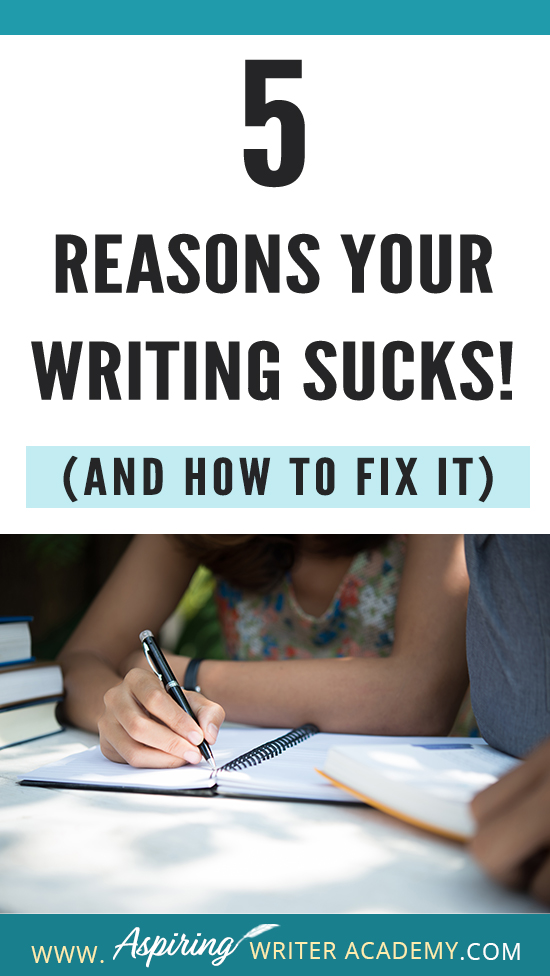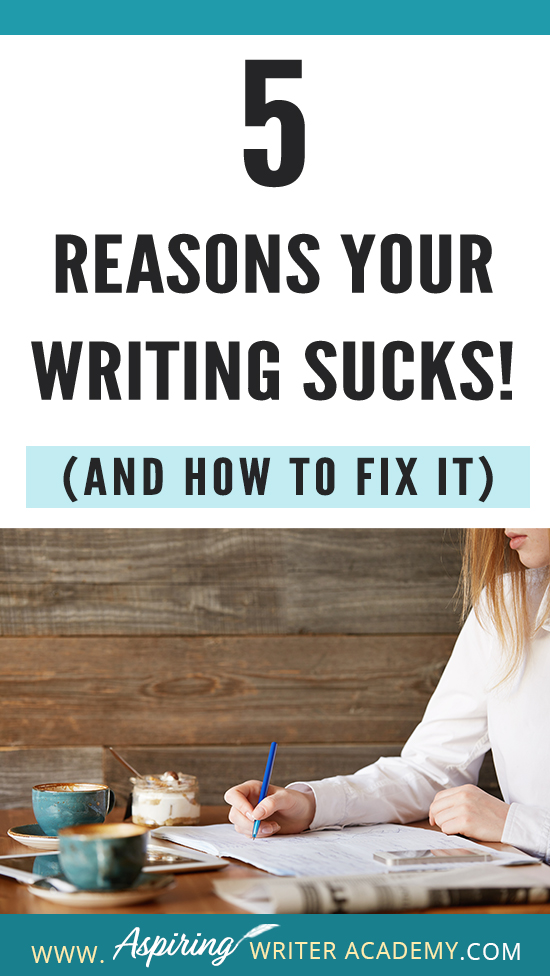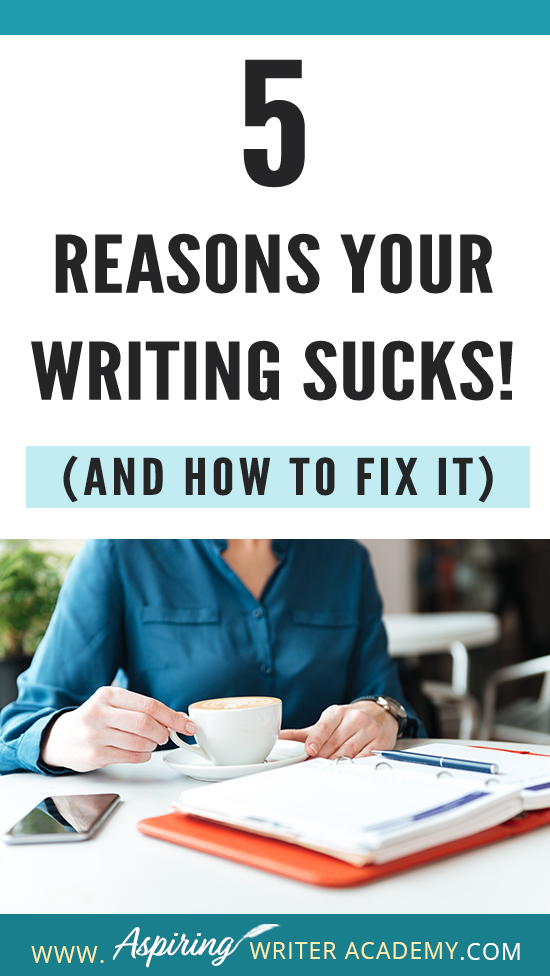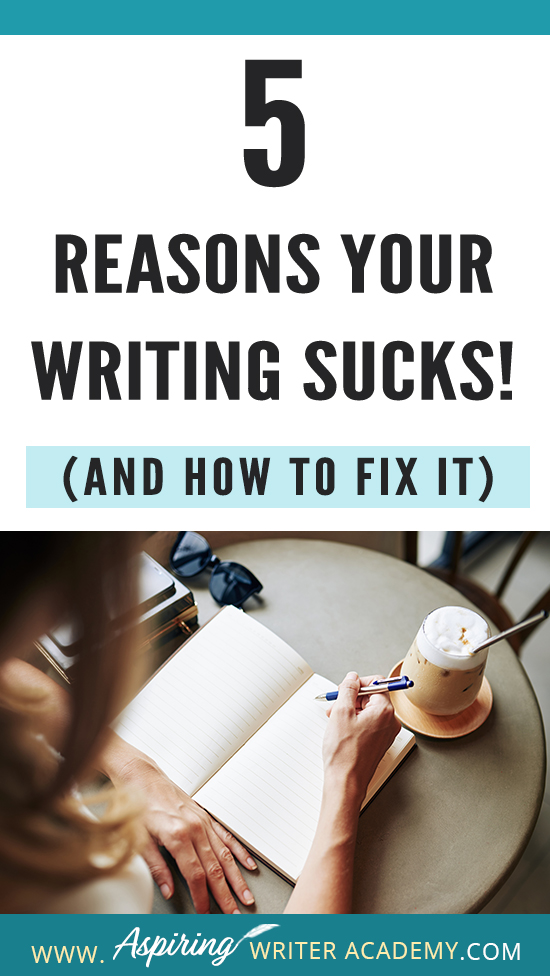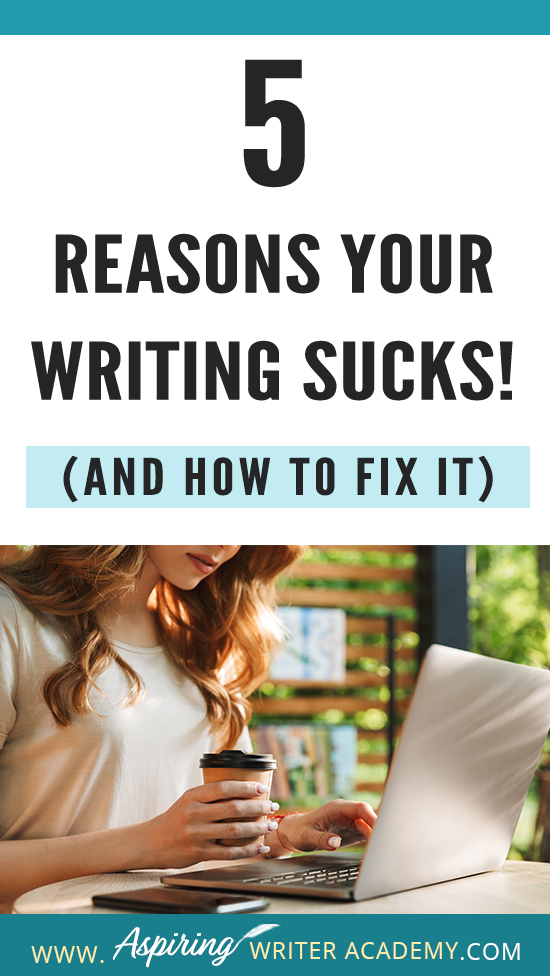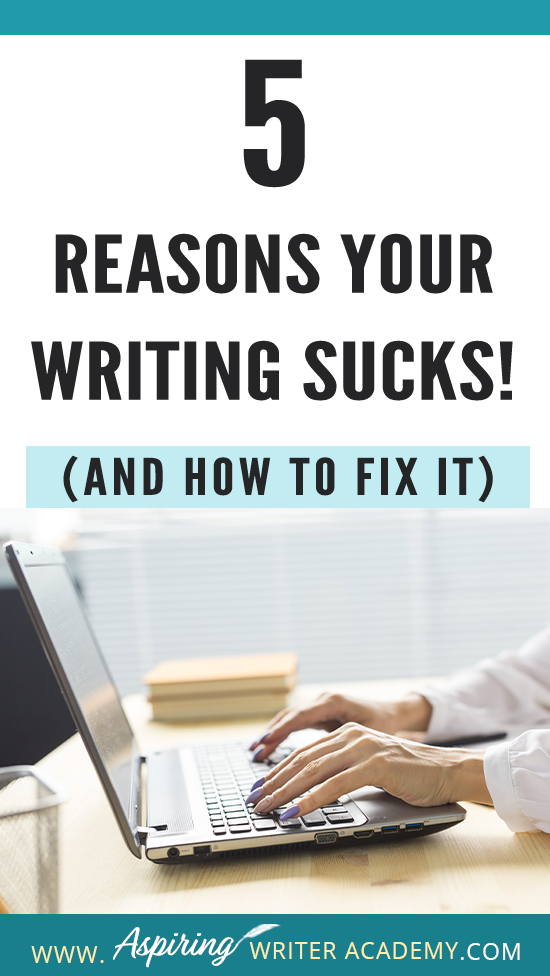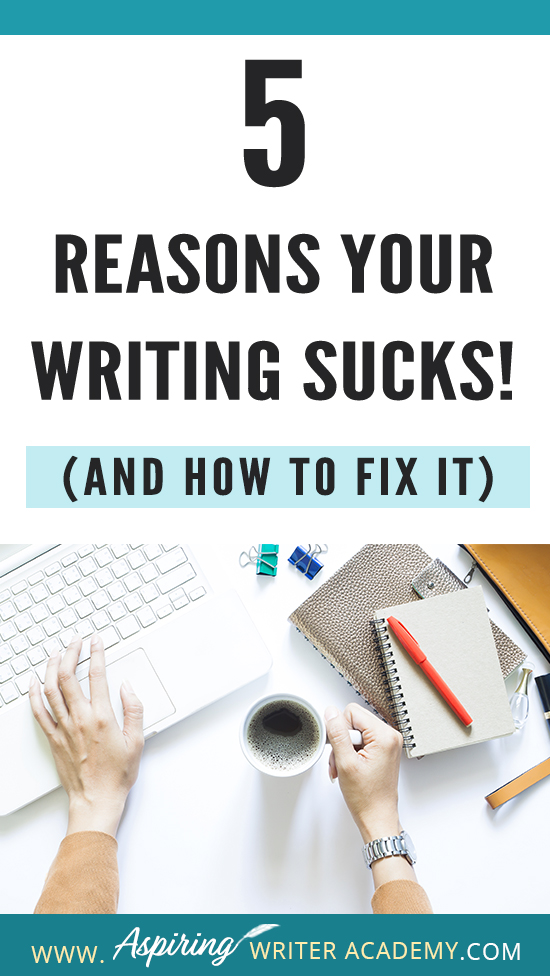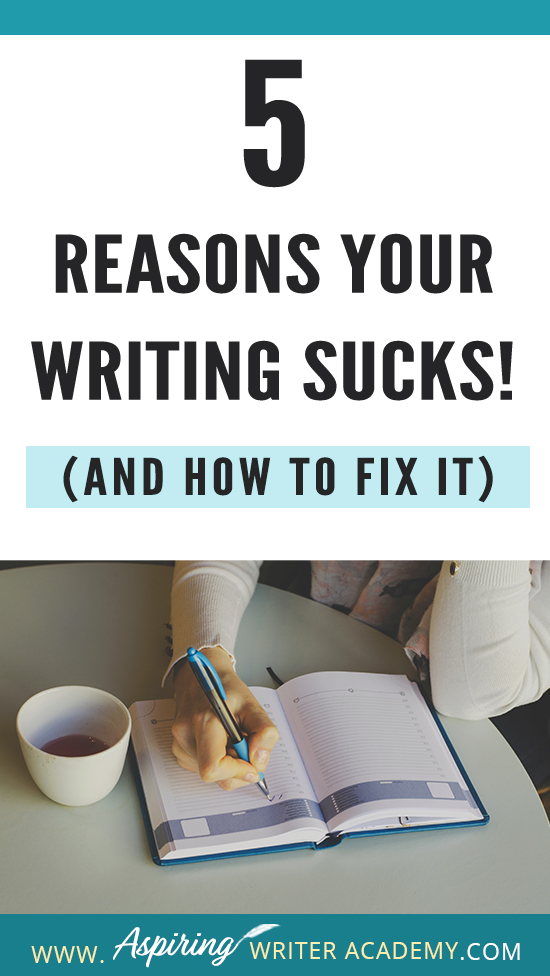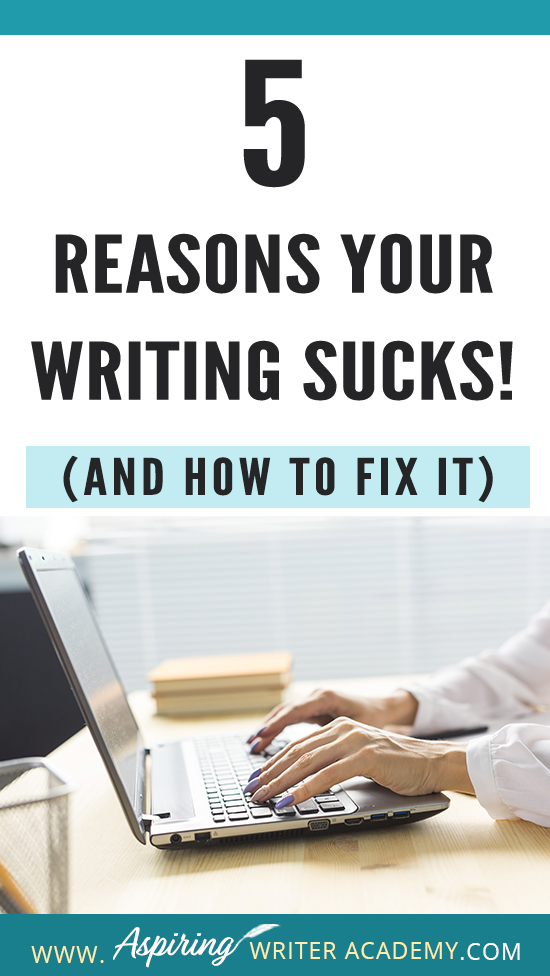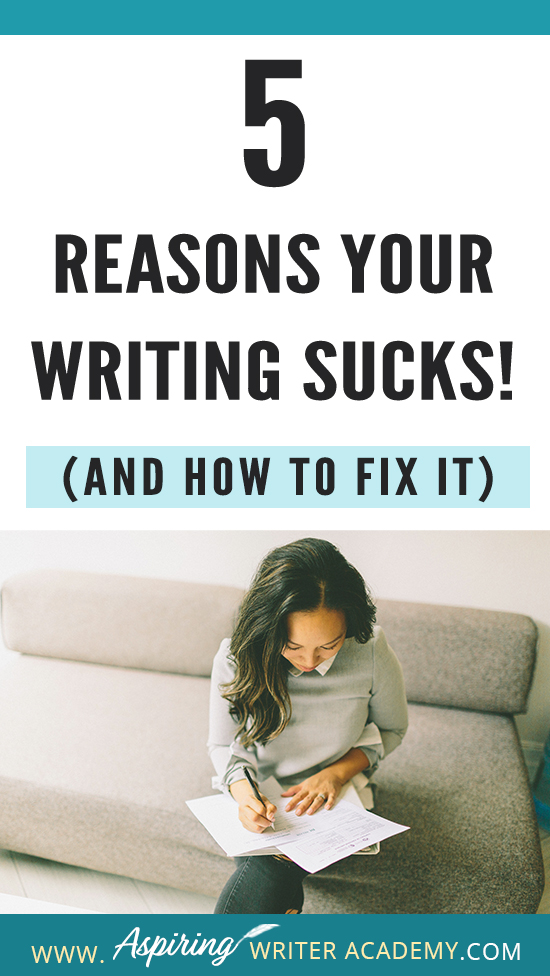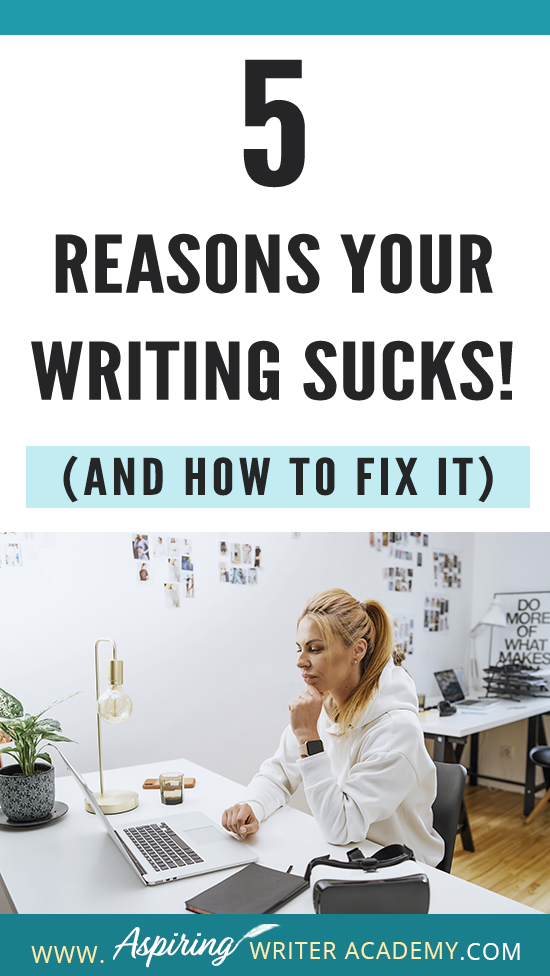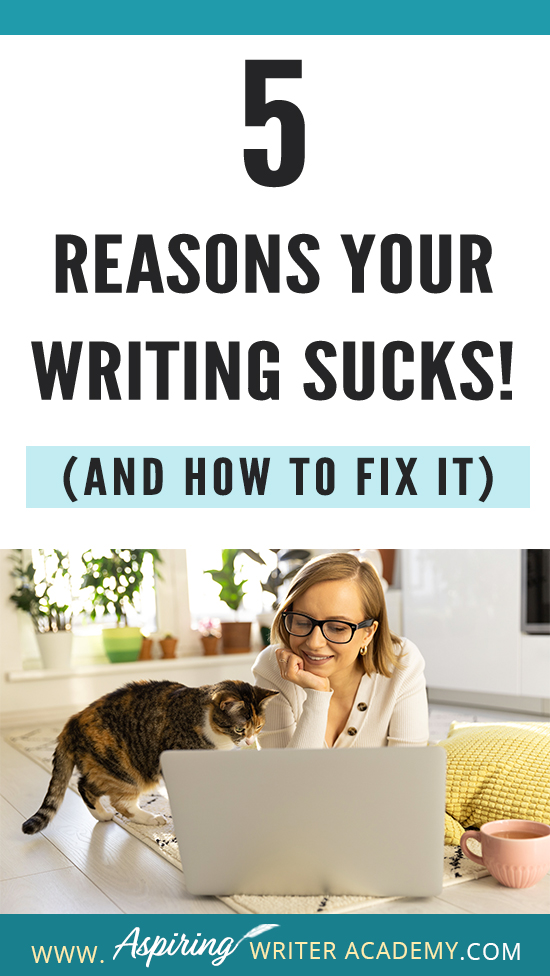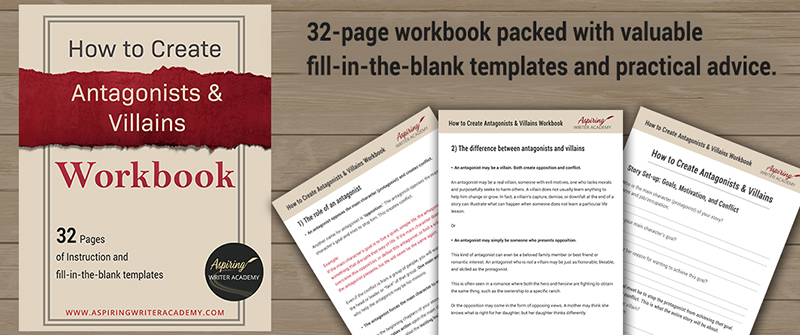5 Reasons Your Writing Sucks! (And How to Fix It)

Have you submitted your manuscript to multiple publishing houses only to receive a slew of rejections? Have the reviewers of your self-published book been less than kind? Do your critique partners suggest your story needs help but do not offer any suggestions on how to fix the problem?
In our post, 5 Reasons Your Writing Sucks! (And How to Fix It), we help you identify areas that may be weak, and list the steps you can take to make your story better.
1) Poor Grammar, Sentence Structure, and Formatting
Let’s face it. If you are going to be a writer, you will need to learn basic writing skills.
If the last essay or piece of written work that you completed was back in high school or college and a couple of decades have gone by, then you may need to brush up on basic grammar, sentence structure, punctuation, and paragraphing skills.
- Do you know the difference between active and passive writing?
- How to spot split infinitives or a dangling modifier?
- How to properly place quotation marks? And other punctuation marks?
- How to correctly paragraph your writing, and keep each character’s thoughts, actions, and dialogue separate from the other characters?
- Do you have too many repetitive words or spelling mistakes?
Or maybe it isn’t your writing skills that are weak, but your computer skills. Today, a writer typically uses a computer with Microsoft Word, Scrivener, or another writing program. If you are not familiar with how to use your device or the programs on it, you may have a serious problem writing your manuscript.
How to Fix It:
- Take a class. Your community may offer classes on basic writing skills, computer skills, and even how to use Microsoft Word and Scrivener. If not, you can find hundreds of classes online which teach these topics.
- YouTube tutorials. You can find almost anything that you want to know on YouTube. These videos will give you step-by-step instructions and give tons of valuable advice. You may even find a series on YouTube which offers more in-depth coverage of the subject that you are most interested in.
- Study How-To Books. In the library or local bookstore, you can find numerous books with comprehensive information on basic writing skills, computer skills, and any other writing-related problem that you may have.
- The Elements of Style by William Strunk Jr. and E.B. White is a book you will commonly find on many authors’ private writing library bookshelf. (A classic! This book will help you brush up your basic writing skills in no time!)
You can also purchase the workbook.
Shop on Amazon: https://amzn.to/3iFIRhC
Shop on Amazon: https://amzn.to/3kjB2yE
2) Believability
If your story contains plot holes, areas where information is missing or poorly explained or just doesn’t make sense, it can ruin the whole story for your readers.
The plot must be believable. Is it realistic that the events in your story could happen? Are the solutions that the characters come up with to solve their problems believable?
If not, can you give the reader more explanation to make these actions and solutions believable? Or is there just no way these things could happen in real life at all?
In fiction, everything happens for a reason, and if your characters act a certain way that your readers cannot understand, then they may very well put the book down.
How to Fix It:
- Add additional detail, backstory, or motivation.
If you already know where you lack areas of believability, brainstorm how you can set up information earlier in the story to make this weak area credible. Many times, the problem can be fixed by providing additional detail or giving the reader the motivation for the characters actions.
Can you provide the reader with additional information or backstory that would make this later scene work? Perhaps show the character several times prior with the skills to perform a specific task like firing a gun or holding their breath underwater for long periods of time. (Or taking steps to learn to do whatever they might need to do later.)
Maybe the character can mention in dialogue with another character that they had obtained certain knowledge in their past that they might use in the future. (Although it is best to show rather than tell.) Your characters must be properly motivated. We need to know what happened in their past to make them act a certain way now. Always ask yourself – why? Why does a character act a certain way? Why does he take a specific action? Why does his world have dogs that can talk? Find a reason, the rationale, to make your story credible.
If writing a fantasy or science fiction story, try to come up something that might explain why a certain creature or magical being or new planet acts a certain way. Use detail to explain how things work. How does this new world’s systems operate?
- Seek someone else’s perspective.
Your second option, especially if you do not know where your weak areas of believably exist, is to get help from outside sources. Other writers may be able to point out weak areas and help brainstorm solutions.
If you do not have a critique group with other like-minded writers, you may want to find one through many of the local and online writing groups.
Or you may want to enter a writing contest judged by agents and editors who can offer feedback. Some writing conferences allow you to sign up for an agent or editor critique of the first few chapters of your manuscript.
Or pay a freelance editor (well worth the money!) to do a macro edit where they will look at the overall plot, character motivations, and big picture elements and give you a heads up on what needs to be changed.
3) Passive, Inactive Characters
In this case, you may have things happening in your story, but it is not the characters driving the story forward. They aren’t really doing anything except reacting. A strong story needs active characters—characters who take action. It is their decisions in one scene that lead to their actions in the next scene. They have a goal and take concrete steps forward to try to achieve that goal, defeating obstacles that stand in their way.
How to Fix It:
- Make sure your characters (both the main character and the opposition) have strong, story-worthy goals that they are striving to achieve.
What is the main character’s goal? (His reason for being in the story?)
What is the main character doing to try to overcome his opposition?
What is the opposition he faces?
If there is a villain, what is he doing to try to prevent the main character from achieving his goal? (He can’t just do one thing; he must fight the main character every step of the way. What is his game-plan?)
There must be conflict in every scene, on every page. A story where your character drifts happily along without anything bad ever happening is boring. Your readers want to see your main character face and overcome conflict. Conflict provides tension and keeps your readers turning pages.
What are the stakes if your character fails? Raise the stakes, make the outcome more personal if he fails to achieve his goal. Make his goal matter! Perhaps make the lives of others hang in the balance.
Check out our blog post: Why Your Characters Need Story-Worthy Goals
- Study up on the elements of Scene & Sequel.
Make sure your scenes connect in a logical order and that your characters are not just reacting to a bunch of random situations thrown at them. It is your characters and their decisions and actions that should drive the story forward. If you have trouble with this, you may need to study the elements of Scene & Sequel.
Check out our blog post: Scene & Sequel: The Secret to Plotting an Epic Novel
4) An Inactive or Cliché Plot
There are some movies and TV series who have fantastic cinematography, seemingly unique characters, and an interesting concept, but the plot isn’t interesting enough to hold the viewer’s interest. Sometimes it feels as if there is no plot. The same is true for books.
Our readers want to learn about something new, not revisit a plot that has been done over and over again. But of course, there are only a handful of different plots in the world, so how do we make them feel new?
How to Fix It:
- Change a cliché story around.
Look at the various plot points. How can you turn the story around and make it different? See what has been done before and take your story in the opposite direction. What might that look like? Can you combine the plots of two or three movies or books to turn your story into something completely unexpected?
- Try to pinpoint what makes your story unique. Is it the characters? The setting? The situation? How can you make these elements even more interesting? Can you make your story a historical instead of a contemporary? Can you change the location? Can you motivate the characters to behave and act differently than the reader would expect? Perhaps combine character roles?
- Follow traditional story structure.
Does the story lack turning points? Turning points change the course of the story and keep the action moving forward. Even in a softer character-driven tale there must be situations that pivot the storyline. Brainstorm how you can make these turning points more meaningful to your characters. How can the consequences coming out of these turning points matter more?
5) Lack of Relevance, Meaning, or Purpose
Similar to the problem of having a boring or cliché plot is the story that doesn’t have a purpose. Sometimes the plot line seems to just randomly swing all over the place.
And sometimes a movie or book can have great description, fantastic scene sets, a full cast of characters, and lots of action but if it does not mean anything to the reader, the story is doomed for failure. The story feels as if it is missing something.
Relevance.
Your reader must be able to relate to the characters and plot in a way that makes them feel invested.
How to Fix It:
- Find and strengthen the story theme.
First, ask yourself: Why did you write this story? What relevance does this story have for you? As an author, what made you decide to write certain elements (characters, plot points, themes) the way you did? What is the story message or theme? Do you even have one? Did you use props, settings, other characters, and specific situations to reveal the theme to your reader? Brainstorm how you might insert or strengthen certain scenes to convey a meaningful message about life, our world, or our culture to the reader. Give your story a soul, give it heart.
- Make the reader care.
Can your target audience relate to the main character driving the story forward? Do they share something similar in their lifestyles or way of thinking?
The number one rule of writing is to make the reader care. Make them feel something. And for that, you need to know who your reader is.
What do they like? What hobbies do they pursue? What kinds of backgrounds do they have? What is important to them? A stay-at-home mom whose number one priority is caring for her family may not be able to relate to a snobby rich heiress who cares for no one but herself.
Create the bond! Hook the reader’s emotions as soon as the story starts. Don’t wait. In the opening scene, place your main character in a situation they must solve that favorably shows some of their strengths. Give the reader a reason to root for this character.
Does this character remain calm when faced with disaster? Will this character risk his life to save others? Is the character treated unfairly by others but remains stoic? Make your character admirable, not just in need of sympathy.
However, to be relatable throughout the rest of the story, your character will also need a weakness. Even Superman was weak against kryptonite. What is your main character’s personal kryptonite? Is this weakness also something the reader can understand and relate to?
We hope you have enjoyed reading 5 Reasons Your Writing Sucks! (And How to Fix It), and that you have learned some valuable tips to help you strengthen your fictional story.
If you have any questions or would like to leave a comment below, we would love to hear from you!
And if you would like additional help developing your story idea, we invite you to download our Free Brainstorming Your Story Idea Worksheet.
Do you find it difficult to create compelling antagonists and villains for your stories? Do your villains feel cartoonish and unbelievable? Do they lack motivation or a specific game plan? Discover the secrets to crafting villains that will stick with your readers long after they finish your story, with our How to Create Antagonists & Villains Workbook.
This 32-page instructional workbook is packed with valuable fill-in-the-blank templates and practical advice to help you create memorable and effective antagonists and villains. Whether you're a seasoned writer or just starting out, this workbook will take your writing to the next level.
Our Goal for Aspiring Writer Academy is to help people learn how to write quality fiction, teach them to publish and promote their work, and to give them the necessary tools to pursue a writing career.
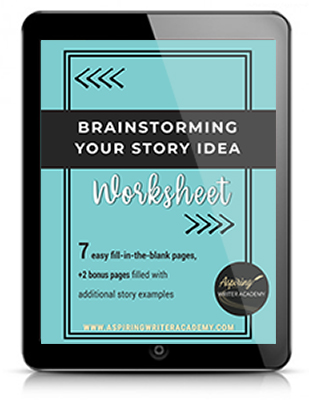
ENTER YOUR EMAIL BELOW
TO GET YOUR FREE
"Brainstorming Your Story Idea Worksheet"
7 easy fill-in-the-blank pages,
+ 2 bonus pages filled with additional story examples.
A valuable tool to develop story plots again and again.
Other Blog Posts You May Like
How to Write Query Letters (for Fiction)
Slingshot Week: How to Set New Goals for Writing in 2023
The Pros and Cons of Writing Holiday Fiction (Collections & Anthologies)
Biggest Self-Publishing Mistakes New Authors Make
Novel Writing Tips: Don’t Bury the Dialogue!
What to Include in Your Author Newsletter
How to Choose Characters to Populate Your Fictional Story
Why Authors Need an Email Newsletter
Fiction Writing: Critique Group Etiquette & Warning Signs of a Good Group Gone Bad
How to Prep for NaNoWriMo (National Novel Writing Month)
Fiction Writing: How to Plot a Story where the Antagonist is an ‘Invisible Foe’
What Authors Need to Know About ISBN Numbers Before Self-Publishing
Fiction Writing: How to Find a Critique Partner/Group
How to Research Information for a Historical Novel
7 Steps to Begin Writing a New Fictional Story
Learn to Plot Fiction Writing Series: Story Analysis of the movie “Signs”
Fiction Writing: How to Get a Literary Agent
How Writing Prompts Can Improve Your Fictional Story
Creative Writing: 5 Ways to Strengthen a Weak Fictional Character
Fiction Writing: Create a Storyboard to Map Out Your Scenes
Fiction Writing: How Specific Details Can Bring Your Setting to Life

is a multi-published author, speaker, and writing coach. She writes sweet contemporary, inspirational, and historical romance and loves teaching aspiring writers how to write quality fiction. Read her inspiring story of how she published her first book and launched a successful writing career.

